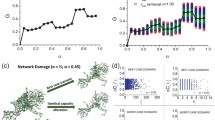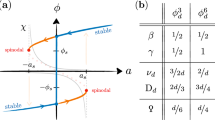Abstract
We introduce an analytical model of cascading behavior of interdependent networks under stressing conditions and find evidence of abrupt breakdown phenomena. Our results indicate that coupling several infrastructures can diminish the impact of small cascades at the cost of increasing system wide ones. As a consequence, the enhancement of the systemic risk failures with increasing network size, represents an effect to be accounted while planning projects aiming to integrate national networks into “super-networks”.
Access this chapter
Tax calculation will be finalised at checkout
Purchases are for personal use only
Similar content being viewed by others
Notes
- 1.
Man-made forms of energy that enable energy to be carried and can then be converted back into any other form of energy.
References
Anderson, P.W.: More is different. Science 177(4047), 393–396 (1972). http://www.sciencemag.org/content/177/4047/393.short
Daniels, H.E.: The statistical theory of the strength of bundles of threads. I. In: Proceedings of the Royal Society of London. Series A. Mathematical and Physical Sciences, vol. 183, no. 995, pp. 405–435 (1945)
Favre-Perrod, P.: A vision of future energy networks. In: Power Engineering Society Inaugural Conference and Exposition in Africa, pp. 13–17. IEEE July 2005
Geidl, M., Koeppel, G., Favre-Perrod, P., Klockl, B., Andersson, G., Frohlich, K.: Energy hubs for the future. IEEE Power Energ. Mag. 5(1), 24–30 (2007)
Martin-Hernandez, J., Wang, H., Mieghem, P.V., D’Agostino, G.: Algebraic connectivity of interdependent networks. Physica A: Stat. Mech. Appl. 404, 92–105 (2014). http://www.sciencedirect.com/science/article/pii/S0378437114001526
Pahwa, S., Scoglio, C., Scala, A.: Abruptness of cascade failures in power grids. Sci. Rep., vol. 4, January 2014. http://dx.doi.org/10.1038/srep03694
Peirce, F.: Tensile tests for cotton yarns, part “v”: the weakest link theorems on strength of long and composite specimens. J. Text. Inst. 17, T355–T368 (1926)
Scala, A., De Sanctis Lucentini, P.G.: The equal load-sharing model of cascade failures in power grids. ArXiv e-prints, June 2015
da Silveira, R.: Comment on “tricritical behavior in rupture induced by disorder”. Phys. Rev. Lett. 80, 3157–3157 (1998)
Wang, H., Li, Q., D’Agostino, G., Havlin, S., Stanley, H.E., Van Mieghem, P.: Effect of the interconnected network structure on the epidemic threshold. Phys. Rev. E 88, 022801 (2013). http://link.aps.org/doi/10.1103/PhysRevE.88.022801
Yagan, O.: Robustness of power systems under a democratic-fiber-bundle-like model. Phys. Rev. E 91, 062811 (2015). http://link.aps.org/doi/10.1103/PhysRevE.91.062811
Acknowledgements
AS, SB and GD acknowledge the support from EU HOME/2013/CIPS/AG/4000005013 project CI2C. AS acknowledges the support from CNR-PNR National Project Crisis-Lab, EU FET project DOLFINS nr 640772 and EU FET project MULTIPLEX nr.317532. GD acknowledges the support from FP7 project n.261788 AFTER.
Any opinion, findings and conclusions or recommendations expressed in this material are those of the author(s) and do not necessary reflect the views of the funding parties.
Author information
Authors and Affiliations
Corresponding author
Editor information
Editors and Affiliations
Rights and permissions
Copyright information
© 2016 Springer International Publishing Switzerland
About this paper
Cite this paper
Scala, A., Sebastio, S., De Sanctis Lucentini, P.G., D’Agostino, G. (2016). A Mean Field Model of Coupled Cascades in Flow Networks. In: Rome, E., Theocharidou, M., Wolthusen, S. (eds) Critical Information Infrastructures Security. CRITIS 2015. Lecture Notes in Computer Science(), vol 9578. Springer, Cham. https://doi.org/10.1007/978-3-319-33331-1_24
Download citation
DOI: https://doi.org/10.1007/978-3-319-33331-1_24
Published:
Publisher Name: Springer, Cham
Print ISBN: 978-3-319-33330-4
Online ISBN: 978-3-319-33331-1
eBook Packages: Computer ScienceComputer Science (R0)




